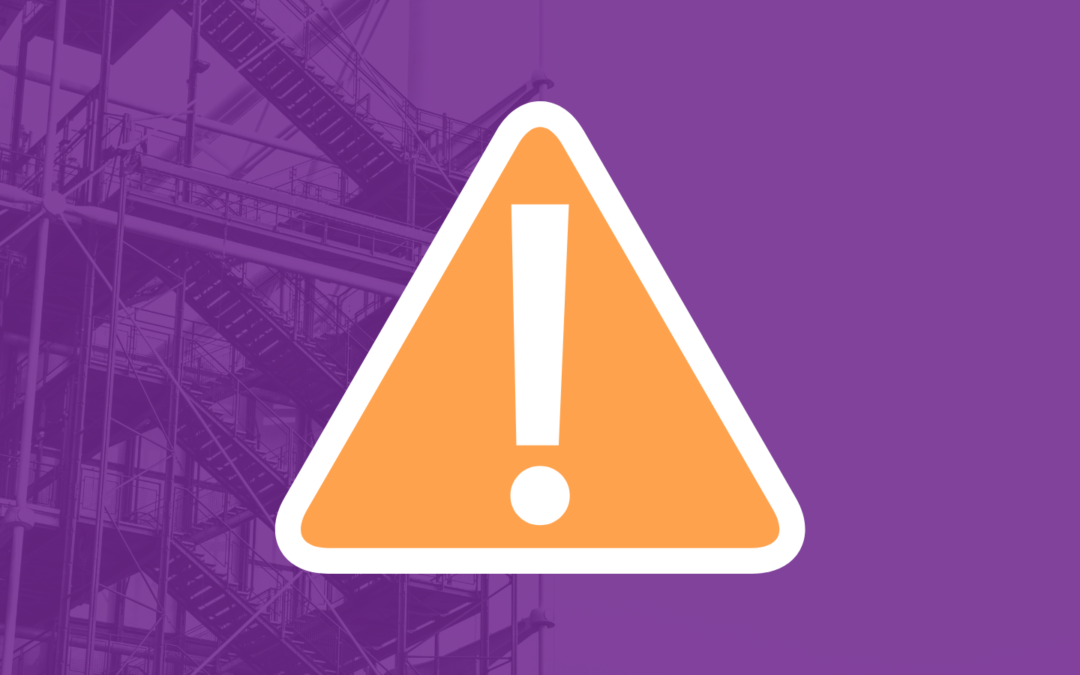
by Oscar Venus | 15 Apr, 2021 | Building Safety Act, Insurance, Main News Feed
If loading out a site and in wake of shortages and potentially taking larger orders of product than would ordinarily be the case, remember to check insurance implications and to survey the area carefully to ensure that any loading limitations on the floor/storage area are adhered to and have factored in risk to protect from environmental (cleanliness, humidity or temperature issues), stacking (adherence to storage instructions) or construction related damage. Also pay particular attention to safety factors that may arise if product is not stacked in accordance with manufacturers instructions and H&S best practice (e.g. leaning/stacking of boards). FIS Site Guides are free to download for members and include some helpful reminders on storage issues.

by Iain McIlwee | 17 Feb, 2021 | Building Safety Act, Insurance
Companies from across the industry are being asked to take part in the biggest ever review of construction’s growing professional indemnity insurance crisis.
In recent years firms from across the industry have reported sharp increases in premiums for PI insurance, while also seeing stricter curbs on the levels of cover. Some firms have reported four-fold increases in policy costs, while others have said that they can no longer secure cover.
This has been driven by multiple factors including a response to higher historic claims from the sector, as well as a cyclical hardening of the insurance market.
The Construction Leadership Council is planning steps to relieve the crisis. This includes developing a robust evidence base, identifying in detail the areas where the
industry is facing the most significant difficulties. The CLC is asking for companies from across the industry to take part in an on-line survey
It asks companies to provide confidential feedback on the costs and policy exclusions that they have experienced when renewing their cover. The poll is entirely confidential, but firms are asked to indicate
their type of business to help target any future support on those areas of greatest need.
Construction Leadership Council Professional Indemnity Insurance Group lead Samantha Peat said: “The Covid-19 pandemic has dominated headlines for the last year, but there is a second crisis that has been quietly growing for businesses across our industry.
“We are speaking to the UK Government and insurers to find ways to help businesses that could otherwise face an uncertain future due to the nature of their PI renewals. We want businesses from across the industry to give us their views – whether you are affected or not – to help us shape the way we prepare a response from the whole sector.
CLC chair Andy Mitchell said: “We have seen in the last year that our industry can deliver real positive change when we work together to tackle shared challenges. Given the feedback from across construction about the difficulties faced by companies, I want to strongly encourage companies to take part in this survey, letting us know about their experiences”
FIS CEO, Iain McIlwee added, “It is good to see CLC drilling down into this issue, we have growing concerns that the market for PI cover is breaking. Companies are being charged more and more for cover that covers less and less and this is now a regular part of our discussions with members. With the number of underwriters willing to look at construction having reduced in recent years, it is only getting worse. Integrated Project Insurance is still scarce, but potentially offers a more effective way of managing our insurable risks – it aligns the insurance to the risk management process, it has added benefits of encouraging earlier engagement and a more collaborative approach to construction. Whatever the solution, something needs to be done as we are heading into an insurance crisis.”
The survey will be live until 12 March 2021. Industry-level details of the results will be published by Construction Leadership Council and will be used to inform ongoing work to support the sector.
FIS is encouraging all members of our community to complete the on-line survey here

by Iain McIlwee | 15 Feb, 2021 | Building Safety Act, Insurance
The Construction Leadership Council (CLC) welcomes the announcement made recently by the Housing Secretary, Rt Hon Robert Jenrick MP on expansion of the Building Safety Fund. This included full funding for the removal of unsafe cladding for leaseholders in all residential buildings 18 metres and over (6 storeys) in England; and a finance scheme to provide reassurance for leaseholders in buildings between 11 and 18 metres (4 to 6 storeys).
The CLC recently submitted an industry wide response ahead the Chancellor’s Budget Statement on 3 March 2021. This focussed on a small number of key interventions including an increase in the funding for the Building Safety Fund to cover the remediation of all eligible buildings and other matters.
Government and industry must continue to work together to ensure the tragedy of the Grenfell Tower fire does not happen again.
The majority of this work is being led by the Ministry of Housing, Communities and Local Government (MHCLG) through their Building Safety Programme and is structured around four key areas: identification of unsafe buildings, making those buildings safe, identifying system problems, and fixing the system.
The construction industry must play its part too and there is already significant work underway.
The Construction Leadership Council Building Safety workstream aims to support CLC and industry engagement with the Grenfell Inquiry, Building Safety Programme, new regulatory bodies and wider work for the built environment. Key objectives include identifying the intersections between the core work of the CLC and Building Safety Programme, where appropriate enhancement and contribution to key building safety regime objectives and driving industry awareness and understanding – key is leadership and culture change both in the immediate (new and existing High Risk Residential Buildings buildings) and longer term for the entire industry.
Over the past two years the Competence Steering Group (CSG) has assembled a coalition of organisations from across the built environment and fire industries together with organisations representing building owners and managers. Their aim was to come up with a blueprint to improve competence for those working on higher-risk buildings, and drive a culture change right across the industry.
The group has produced 2 reports – Raising the Bar published in August 2019 and Setting the Bar published in October 2020. The work was initiated by the recommendations in Dame Judith Hackitt’s review Building a Safer Future. Since the publication of the ‘Setting the Bar’, the CSG and its 13 Working Groups have consulted widely and taken on board feedback as they have continued to develop sector frameworks. These frameworks will provide the skills, knowledge, experience and behaviours needed to carry out specific roles, and deliver a more rigorous approach to the essential training and assessment that is required.
In addition, MHCLG has commissioned the National Standards Body, BSI, to develop the National Standards for the overarching competence framework and accompanying Publicly Available Specifications (PAS) standards for the three regulated roles of Principal Designer, Principal Contractor and Building Safety Manager.
Improved product safety is also a key part of building safety reforms. Work has been ongoing over the past few years to ensure that the products that go into buildings are safe and therefore buildings are safe. This work has been aligned with the recommendations in Dame Judith Hackitt’s 2018 report Building a Safer Future and the draft building safety bill published by MHCLG in July 2020. This includes the industry development of a code for construction product information, led by the Construction Products Association’s Marketing Integrity Group. The aim of the code is to have a robust and consistent approach to how construction product information is communicated. The draft code proposes the principles of clear, accurate, up to date, accessible and unambiguous information through 11 clauses.
Throughout 2021, the Building Safety workstream will look to share and update the industry via the CLC website on key work and announcements. Most recent activity includes:
- The Government has announced a new national regulator for construction products operating within the Office for Product Safety and Standards (OPSS). An independent review has also commissioned to examine weaknesses in previous testing regimes for construction products, and to recommend how abuse of the testing system can be prevented.
- Launch of the industry consultation on a proposed new code for construction product information.
- Recent article by Graham Watts, Chief Executive of the Construction Industry Council, a Member of the MHCLG Industry Response Group and Chair of its Competence Steering Group.
All in the industry must engage and play their part to improve.
Iain McIlwee FIS CEO added “It is clear that the industry is needs to pull out all of the stops to ensure that profound changes to culture and process happen, but for me the fund still falls short of attacking the problem head on. Cladding is but one issue, it is not addressing the wider aspects that were uncovered in Grenfell and previous disasters. It also concerns me that there is now talk of a levy on development, which could potentially impact funding for future works. For me we are still looking at systemic failure – the Building Safety Fund needs to be more ambitious and better targeted. The Pension Protection Fund offers a good parallel and has been effective in targeting and overcoming A more thinly spread levy, linked to e.g. Insurance Premium Tax that does not leave lease-holders with debilitating loans and further angst”.
FIS Three Steps to Rebuilding Construction

by Clair Mooney | 25 Jan, 2021 | Building Safety Act, Market data
FIS Members are invited to take part in an industry-wide consultation into a new proposed Code for Construction Product Information (CCPI), to gather the views on the Code before it is formally launched later this year.
The Code has been developed by the CPA’s Marketing Integrity Group (MIG) with input from FIS, which was tasked with responding to the issues raised in Dame Judith Hackitt’s report ‘Building A Safer Future’, and the credibility challenge facing our industry following the Grenfell Tower fire. The report confirmed radical change was needed for construction products, particularly in the areas of testing, information and marketing.
The Code, made up of 11 clauses, aims to set the benchmark for how product information is presented and marketed by manufacturers. A new microsite dedicated to this consultation – www.buildingsafely.co.uk – explains the background, and includes a specially written report on the new Code. It’s presented in an easy-to-read, digestible format for the industry to review and respond.
The MIG’s work tackles shortcomings in ‘Product Information’ identified in Chapter 7 of the ‘Building A Safer Future’ report. Its work represents two years of open debate and discussion, and of engagement with various parts of the supply chain. It follows detailed analysis of the Call For Evidence survey in 2019, which attracted over 500 responses from across the industry. The survey confirmed that for product and performance information to be trusted, it must be Clear, Accurate, Up-to-date, Accessible and Unambiguous. These five points are the acid tests that now stand behind the 11 Clauses in the new Code.
The MIG is driving a wide-reaching consultation to give manufacturers, specifiers and users of information an opportunity to comment on the new Code, the implementation of its 11 Clauses, and its ongoing management and policing. The consultation is being carried out independently by industry specialists, MRA Research.
CPA Chief Executive Peter Caplehorn comments: “The importance of this new Code and consultation process will be obvious to all those working in the built environment post-Grenfell. It is our responsibility as an industry to regain public trust and credibility in what we do, and to demonstrate that technical competence can be trusted. I believe the Code represents both a determined attempt on behalf of manufacturers to correct disingenuous marketing practices and a proactive and collaborative effort to address the issues highlighted in Dame Judith Hackitt’s Report.
“The first industry consultation in 2019 was key in establishing the way forward. We are now encouraging all FIS Members to have their say once more before the Code is launched. CPA are reaching out to every organisation across the construction supply chain, whether that be manufacturers, specifiers, suppliers, distributors, contractors or installers. They hope businesses and individuals will embrace the opportunity to be involved, and recognise the urgency of change that is needed for our industry to ensure safe buildings.”
MIG Chair Adam Turk adds: “Following Grenfell, our industry reputation has been damaged. This Code is an opportunity to demonstrate our commitment to setting a level playing field for all construction product manufacturers to ensure that information they provide passes the five acid tests. In particular, that users of our products can once again rely upon the information given to them, to build the great buildings and infrastructure in which we live, work and play.”
We think this is one of the biggest changes in the way that manufacturers describe their products and demonstrate their commitment to Clear, Accurate, Up-to-date, Accessible and Unambiguous information, and we see this as a mark of quality that all members will want to be associated with.
Download the Code for Construction Products Information at www.buildingsafely.co.uk and register to have your say. The consultation will open on 1st February and run until 31 March.
FIS will be holding a webinar on Friday 5 February to expand on this introduction and discuss any questions that you may have before submitting your response. To register please follow this link https://www.eventbrite.co.uk/e/consultation-on-new-code-for-construction-product-information-tickets-138263563039

by Clair Mooney | 25 Jan, 2021 | Building Safety Act, Skills
FIS has launched Career and Competency Pathways ways as the first in a structured approach to defining competency and career paths within the Finishes and Interiors Sector.
The new Framework is built on the principles of the FIS Competency Skill, Attitude, Knowledge and Experience (SAKE) Framework and provides an example of how an individual can progress in a finishes and interiors occupation. It is designed to help companies manage competency in the face of intense scrutiny and new requirements coming into force through the Building Safety Bill. The Framework provides some standardisation and lays down clear criteria to assess and prove competence at every level of the workforce.
Commenting on the launch of the Pathways, FIS Skills and Training Lead George Swann said: “The Pathways brings a structured approach to career management based on the development of skills, knowledge and building experience. It aims to support and encourage career progression by passing defining competency gateways based on measured outcomes and linking this back to qualifications and training available. Our hope is that this makes it easier for everybody – new entrants, experienced workers, supervisors and managers – to follow how individuals progress within our sector and understand how to nurture and demonstrate competence.”
The Pathways looks at both formal and informal training requirements. Whilst formally recognised qualifications form the bedrock of progression through an occupation and are the criteria for CSCS card registration, these are not the only measure of competence. At each step in a career progression, the matrix suggests informal training that may support individual and organisational needs.
For new entrants to the sector, embedded in the matrix are details of apprenticeships delivered in each of the home nations. All listed training, qualifications and apprenticeships are available through the FIS Approved Training Provider Network.
“As a guide the matrix proposes ‘normal time frames’ based on the maximum formal qualification completion times or Total Qualification Times, but recognises individuals learn at different rates, so these may not always be applicable. Attitude and opportunity may move people through a career faster than others, but at each stage proof of competency is vital,” added George Swann.
Initial work has taken place on Drylining and Ceiling Fixing Pathways and FIS aims to launch further frameworks to cover the core occupational areas within the £10 billion finishes and interiors sector workforce in the coming months.
For more information and to view the Career and Competency Path click here
For more information on FIS Skills and Competency Work visit our the FIS Skills Hub

by Iain McIlwee | 19 Jan, 2021 | Building Safety Act, Main News Feed
Residents will be protected through the establishment of a national regulator which will ensure materials used to build homes will be made safer, the Housing Secretary Robert Jenrick has announced today (19 January 2021).
The regulator for construction products will have the power to remove any product from the market that presents a significant safety risk and prosecute any companies who flout the rules on product safety. This follows recent testimony to the Grenfell Inquiry that shone a light on the dishonest practice by some manufacturers of construction products, including deliberate attempts to game the system and rig the results of safety tests.
The regulator will have strong enforcement powers including the ability to conduct its own product-testing when investigating concerns. Businesses must ensure that their products are safe before being sold in addition to testing products against safety standards.
This marks the next major chapter in the government’s fundamental overhaul of regulatory systems. The progress on regulatory reform includes the publication of an ambitious draft Building Safety Bill, representing the biggest improvements to regulations in 40 years, and a new Building Safety Regulator that is already up and running in shadow form.
Housing Secretary Rt Hon Robert Jenrick MP said:
The Grenfell Inquiry has heard deeply disturbing allegations of malpractice by some construction product manufacturers and their employees, and of the weaknesses of the present product testing regime.
We are establishing a national regulator to address these concerns and a review into testing to ensure our national approach is fit for purpose. We will continue to listen to the evidence emerging in the Inquiry, and await the judge’s ultimate recommendation – but it is already clear that action is required now and that is what we are doing.
Business Minister and Minister for London Paul Scully said:
We all remember the tragic scenes at Grenfell Tower, and the entirely justified anger which so many of us in London and throughout the UK continue to feel at the failings it exposed.
This must never happen again, which is why we are launching a new national regulator for construction materials, informed by the expertise that already exists within the Office for Product Safety and Standards.
Chair of the Independent Review of Building Regulations and Fire Safety Dame Judith Hackitt said:
This is another really important step in delivering the new regulatory system for building safety. The evidence of poor practice and lack of enforcement in the past has been laid bare. As the industry itself starts to address its shortcomings I see a real opportunity to make great progress in conjunction with the national regulator.
Iain McIlwee, CEO of Finishes and Interiors Sector (FIS) stated:
Bad enforcement is worse than bad regulation as it tilts the market in the favour of the unscrupulous. At the heart of FIS strategy is the FIS Product Process People (PPP) Quality framework, it is no coincidence that the first P is Product. We welcome the new regulator and the principles set down in the Building Safety Bill and look forward to working with all involved in helping to lead improvements in quality and safety in the market.
The regulator will operate within the Office for Product Safety and Standards (OPSS) which will be expanded and given up to £10 million in funding to establish the new function. It will work with the Building Safety Regulator and Trading Standards to encourage and enforce compliance.
The government has also commissioned an independent review to examine weaknesses in previous testing regimes for construction products, and to recommend how abuse of the testing system can be prevented.
It will be led by a panel of experts with regulatory, technical and construction industry experience and will report later this year with recommendations.
Firestopping of service penetrations: a new best practice guide
Page 23 of 24« First«...10...2021222324>





